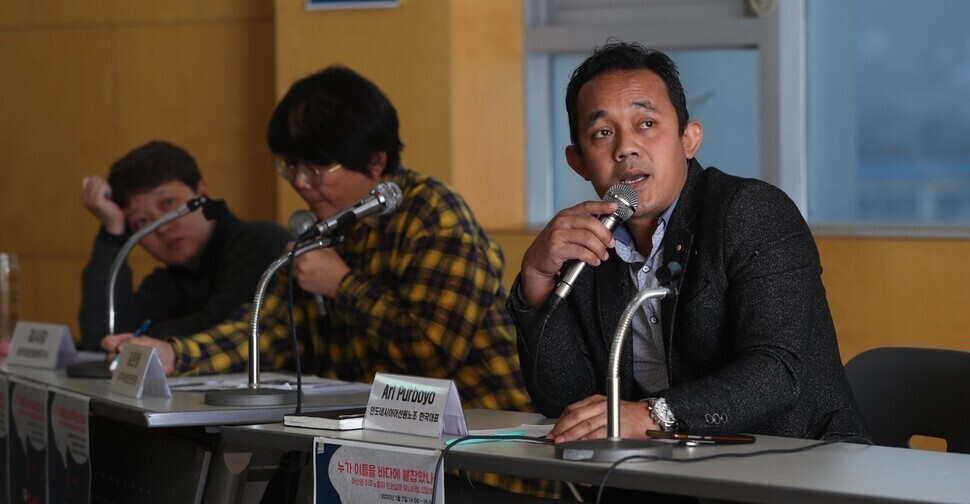hankyoreh
Links to other country sites 다른 나라 사이트 링크
S. Korea promises to address human rights violations against migrant fishers

The South Korean government has apologized and come out with measures to address violations of the labor and human rights of migrant fishing boat workers, an issue that has shown no signs of improvement for many years. The measures include instituting effective public management of the dispatching and acceptance of migrant fishers through agreements with major dispatching nations, while having the Coast Guard participate alongside civic groups in on-site crew investigations and introducing stiffer penalties such as engineer license revocation for boat owners who violate human rights.
The Ministry of Oceans and Fisheries (MOF) announced the measures in a briefing on June 9 at the Sejong Government Complex. In response to the findings announced a day earlier on June 8 by the Human Rights Network for Migrant Fishermen concerning human rights violations, Kim Joon-seok, director of the MOF’s shipping and logistics bureau, said, “We apologize deeply for inadequacies in the protections of human rights for migrant fishers.”
“When I consider how South Korea was also a major source of dispatch crew members in the 1960s and onwards and achieved today’s economic growth through the foreign currency they earned working under harsh conditions, I truly sense the need to improve the poor working environments faced by migrant fishers working in South Korea,” he added.
According to figures published by the Human Rights Network for Migrant Fishermen, the average working hours for 54 migrant fishers who worked on South Korean deep-sea fishing boats between 2016 and 2019 totaled 16.9 per day, with 41% of them reporting that they had received less than US$500 in monthly wages.
As a first step, MOF plans to have the public sector manage the migrant fisher human resource pool by establishing memoranda of understanding (MOUs) with countries that send large numbers of migrant fishers. It would amount to a form of public dispatching system. The measure is aimed at eradicating practices by private human resource dispatching businesses, such as demanding excessively large placement fees in exchange for sending migrant fishers to South Korea or insisting on land documents, diplomas, and the like as “guarantees” against quitting.
“Since the first half of the year, we’ve established a channel and carried out procedures to establish an MOU with the government of Indonesia, which accounts for 35% of the migrant fishers who have come to South Korea,” Kim Joon-seok explained, adding that the ministry “also plans to contact the governments of Vietnam, the Philippines, and Myanmar in the future.”
Additionally, the number of inspections of migrant fisher conditions per year is to be increased from one to two, with the Coast Guard to also participate alongside labor supervisors. Other plans include amending related laws to prohibit the assignment of migrant fishers and potentially revoke the engineer licenses of boat owners who are convicted for violations of human rights.
To improve poor working conditions, lodging standards are also to be established for fishing boats weighing 20 tons or more, which are not currently subject to such standards. Support is to be provided from a safety fund of 170 billion won (US$142.9 million) established last year. By using the safety fund, owners can retrofit old vessels while paying a 10% share of costs, or replace them with newer vessels.
The MOF also said it was actively considering ratification of the International Labour Organization’s “Work in Fishing Convention” (C.188) in connection with guarantees on labor rights, including a minimum wage and break times on deep-sea fishing vessels. At the same time, Kim explained, “In the case of deep-sea fishing vessels, it’s difficult to apply the same working conditions [standards] as on land due to the long shoal detection periods and difficulties adjusting actual fishing times.”
“Since we would need to precisely establish fishing conditions for deep-sea vessels to apply the convention domestically, we are currently commissioning related research,” he added.
By Jin Myeong-seon, staff reporter
Please direct comments or questions to [english@hani.co.kr]

Editorial・opinion
![[Guest essay] Preventing Korean Peninsula from becoming front line of new cold war [Guest essay] Preventing Korean Peninsula from becoming front line of new cold war](https://flexible.img.hani.co.kr/flexible/normal/500/300/imgdb/original/2024/0507/7217150679227807.jpg) [Guest essay] Preventing Korean Peninsula from becoming front line of new cold war
[Guest essay] Preventing Korean Peninsula from becoming front line of new cold war![[Column] The state is back — but is it in business? [Column] The state is back — but is it in business?](https://flexible.img.hani.co.kr/flexible/normal/500/300/imgdb/original/2024/0506/8217149564092725.jpg) [Column] The state is back — but is it in business?
[Column] The state is back — but is it in business?- [Column] Life on our Trisolaris
- [Editorial] Penalties for airing allegations against Korea’s first lady endanger free press
- [Editorial] Yoon must halt procurement of SM-3 interceptor missiles
- [Guest essay] Maybe Korea’s rapid population decline is an opportunity, not a crisis
- [Column] Can Yoon steer diplomacy with Russia, China back on track?
- [Column] Season 2 of special prosecutor probe may be coming to Korea soon
- [Column] Park Geun-hye déjà vu in Yoon Suk-yeol
- [Editorial] New weight of N. Korea’s nuclear threats makes dialogue all the more urgent
Most viewed articles
- 1Yoon’s broken-compass diplomacy is steering Korea into serving US, Japanese interests
- 2[Guest essay] Preventing Korean Peninsula from becoming front line of new cold war
- 3S. Korean first lady likely to face questioning by prosecutors over Dior handbag scandal
- 4Lee Jung-jae of “Squid Game” named on A100 list of most influential Asian Pacific leaders
- 5After 2 years in office, Yoon’s promises of fairness, common sense ring hollow
- 6Hybe-Ador dispute shines light on pervasive issues behind K-pop’s tidy facade
- 7Japan says it’s not pressuring Naver to sell Line, but Korean insiders say otherwise
- 8[Column] The state is back — but is it in business?
- 9Amid US-China clash, Korea must remember its failures in the 19th century, advises scholar
- 10[Editorial] Japan’s removal of forced labor memorial tramples on remembrance, reflection and friends